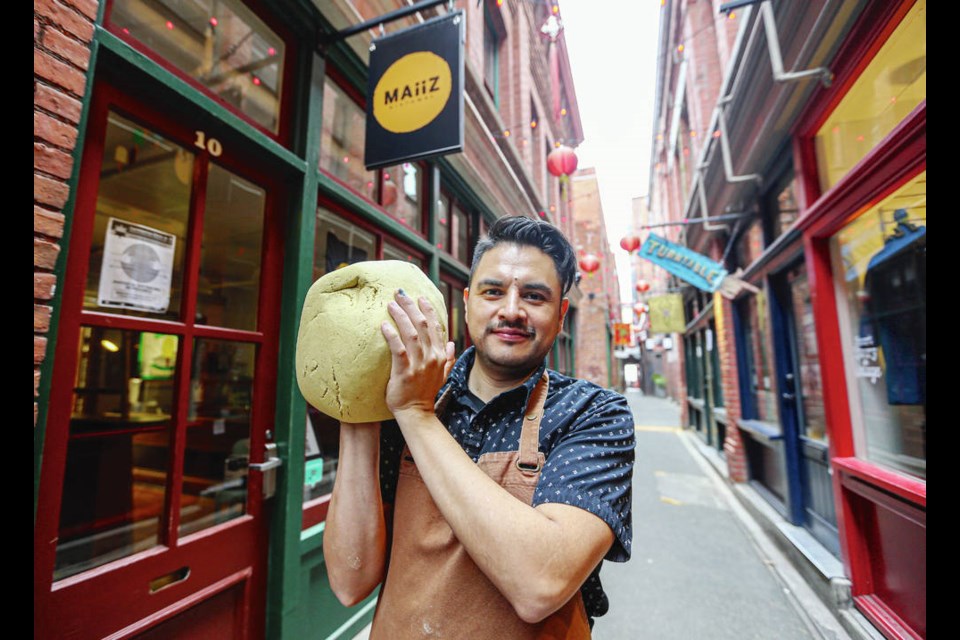Corn is considered a grain, fruit and vegetable. But to Israel Alverez, once one of the top chefs in Mexico City, maize means much more.
It’s about history and culture and the belief that his meso- american ancestors were not only the first consumers and cultivators, but emerged from the corn plant itself.
So it’s not a surprise that Alverez — a Canadian citizen since 2018 — is passionate about his new business, Maiiz, which celebrates corn’s rich past and the process that has made tortillas one of the world’s great food staples.
Alverez makes corn tortillas using nixtamalization, a labour-intensive process that dates back to early Aztec and Mayan cultures. Corn is soaked and cooked in an alkaline solution — usually slaked lime — then washed, hulled and ground into masa dough before being pressed into tortillas.
Nixtamalization enhances the nutritional vitamins and minerals in comparison with raw corn, says Alverez, and the fresh dough is used to make tortillas immediately.
Alverez says the “industrial” methods used today see ground corn dehydrated and made into maseca flour, but the extra processing sacrifices texture and flavour.
“It’s like having fresh potatoes or potatoes out of a box … like having fresh-baked bread from a bakery or processed bread … like freshly ground espresso or instant coffee,” says Alverez. “The difference in quality is very big.”
Alverez says mass production of the tortilla started in the early 1990s after the launch of the North American Free Trade Agreement, when cheap, industrialized tortillas using genetically modified corn started flooding the U.S. and Canadian markets.
In the meantime, nixtamalization was being lost.
He saw his new opportunity in Canada as a way to reinvigorate the ancient process. The pandemic put a crimp in his plans when organic corn from Mexico became more difficult to ship.
But then Alverez found an Abbotsford-based certified-organic farmer who could supply him with a yellow dent variety of corn that works well using nixtamalization.
His tortillas topped with local produce were a resounding success when served at pop-up locations around the city, and sales to local restaurants and grocery stores are increasing by the week.
Eight grocers, including Pepper's Foods and Michell’s Farm Market, carry the Maiiz brand, while eight restaurants, such as Boom+Batten, The Village, Cafe Mexico and Canoe Brew Pub, use the tortillas to make their own tacos.
The demand is keeping Alverez busy.
He’s sub-leasing an ice cream shop at 10 Fan Tan Alley in Chinatown for the fall and winter months for a retail outlet and production centre, and has hired an employee to assist him.
He’s also waiting for more equipment to arrive from Mexico that will allow him to increase production and expand his sales to the rest of the Island and into the Lower Mainland.
It all leaves Alverez, now 40, feeling grateful.
In 2008, he was called one of the top chefs in Mexico City, riding a high of publicity for his culinary creations at Pujol’s, a Zagat-rated restaurant.
But the fame also brought unwanted attention and an attempted kidnapping for ransom, which was becoming common for anyone with celebrity in one of the world’s largest cities.
“I had to leave the country for my own security,” said Alverez. “It was an overwhelming experience. I did not want to stay, even though my career was going so well.”
He was hired as a chef in Edmonton amid an oil boom in the province, worked there for a decade and earned his permanent residency, then full citizenship. Alverez said he tried marketing his tortillas in the Alberta capital, but it wasn’t catching on. The Island, he said, was a different story.
“It took no time at all to get acceptance from the community,” said Alverez. “People here are interested in many different types of food. There is an interest in culture.”
Alverez will be hosting a special dinner for temporary foreign workers at Michell farms at the end of the month. “I just want to bring them a little taste of Mexico and to thank them for the good job they are doing and the sacrifices they made to come here during quarantine,” he said.



